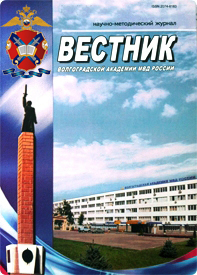The peculiarities of the natural language allow for a multivariate interpretation due to the inaccurate certainty of its dictionary, syntax and semantics. This allows the absence of a precise interpretation of the terms in the language. Accordingly it can be argued that there are no terms for precise interpretation in any legislative provisions, since they are formulated through natural languages.This creates an inevitable plurality of meanings of the legal text. At the same time, absolute freedom of interpretation of language terms does not allow creating any dictionary within any language at all. Since language and law are connected, unrestricted freedom to choose the legal sense makes the reasoning about the law itself pointless. Thus, the plurality of legal senses is incompatible with legal prescriptions. The limitation of the plurality of legal senses takes place according to the intersubject or conventional model. The intersubject model can lead to quasi-objectivity of legal sense but this model does not always work either. The conventional model will carry both convergent and conformal features. The balance between them is determined by the peculiarities of the socio-legal context and psychology of the subject involved in the orbit of legal sense formation.
the system of law, the system of legislation, sign of law, sense of law, meaning of law, referent of law, designatum of law, denotatum of law, language of law, polysemy of legal text, object language of law
1. Popov V. V. Vzglyad na pravo cherez prizmu semioticheskogo treugol'nika: problema edinstvennosti pravovogo smysla // Vestnik Volgogradskoy akademii MVD Rossii. 2017. № 3. S. 142-146.
2. Mauthner F., Beiträge zu einer Kritik der Sprache. Bd. 1: Zur Sprache und zur Psychologie. Frankfurt am Main, Berlin,Wien. 1982. 713 p.
3. Bayteeva M. V. Problemy ponimaniya prava s poziciy fenomenologichesko germenevtiki // Rossiyskiy ezhegodnik teorii prava. 2011. № 4.
4. Pavilenis R. I. Problema smysla: sovremennyy logiko-filosofskiy analiz yazyka. M.: Mysl', 1983. 286 s.
5. Cherdancev A. F. Tolkovanie sovetskogo prava. M.: Yurid. lit., 1979. 166 c.
6. Edwards R. The Role of a Judge in Modern Society: some reflections on Current Practice in Federal Appellate Adjudication // 32 Clev. St. Law Review. 1984. № 32. P. 395.
7. Raz J. The Authority of Law: Essays on Law and Morality. Oxford, Clarendon Press, 1979. 180 p.
8. Nikitin E.P. Ob'yasnenie - funkciya nauki. Moskva: Nauka, 1970. 280 s.
9. Marmor A. Interpretation and Legal Theory. Oxford, Clarendon Press, 1992. 185 p.
10. Bulygin E. V. K probleme ob'ektivnosti prava// Fіlosofіya prava: suchasnі іnterpretacії : Vibr. pracі: stattі, analіt.oglyadi, perekladi (2003-2010) / S. І. Maksimov. Har'kіv: Pravo, 2010. 336 s.
11. Troper M. Svoboda tolkovaniya u konstitucionnogo sud'i // Rossiyskiy ezhegodnik teorii prava. 2011. № 4.
12. Barak A. Sudeyskoe usmotrenie. M.: Norma,1999. 376 s.
13. Goloskokov L. V. Teoriya setevogo prava / Pod red A.V. Mal'ko SPb., 2006. 191 s.
14. Wittgenstein L. Philosophical Investigation. Oxford: Basil Blackwel l; N.Y.: Macmillan, 1958. 249 p.









